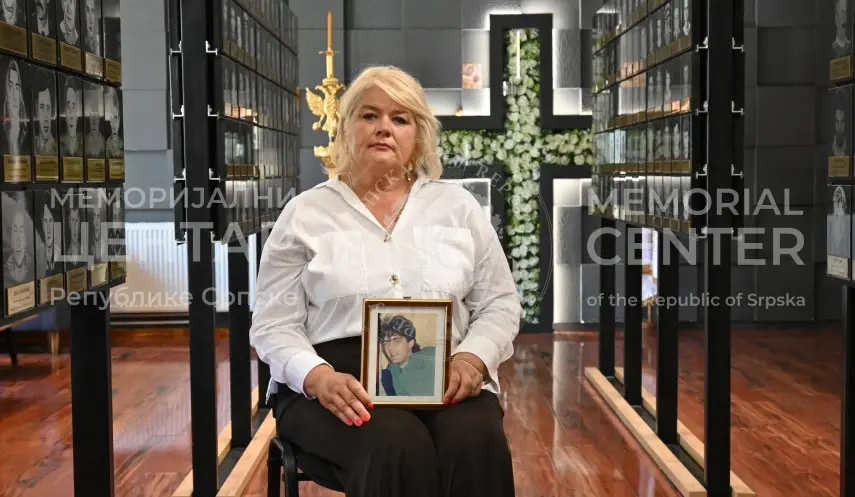TESTIMONY OF ALJONKA DŽELETOVIĆ ABOUT HER BROTHER MILENKO
Republika Srpska - Memorial Center
09/04/2025
13:59

BANJA LUKA, SEPTEMBER 3 /SRNA/ – The Memorial Center of Republika Srpska has established in Nevesinje its eighth regional study center for recording audio-video testimonies of family members of fallen and missing civilians and soldiers from the Defensive-Patriotic War, and the first testimony was given by Aljonka Dželetović, who spoke about the life and tragic fate of her brother Milenko Milović, who went missing in Mostar in 1992.
According to her, their family home was on the left bank of Mostar, where she was last on June 11, 1992, and only a few days later, the persecution of Serbs from the left bank began.
“At that time, my brother told me, ‘Don’t let me see you coming here again.’ It wasn’t safe. People were being killed on the main road, in transit. I didn’t come back anymore. That was the last time we saw each other,” told Dželetović, who is also the president of the Organization of Families of Captured and Fallen Soldiers and Missing Civilians of Nevesinje.
She said her brother’s body was never found and that she knows he was captured alive.
“Over time, we came across a video cassette from the scene. The footage shows the terrain through which the HVO and HOS passed, bodies can be seen, and there is talk about that event. We also came across the names of the people who captured him. Eight years later, a case was formed and forwarded to the prosecutor’s office. But to this day, no verdict. They have video evidence, they have names. But nothing. As long as verdicts come from Sarajevo – there won’t be any,” Dželetović is convinced.
She added that the only things left of her brother are two of his shirts, which were never washed, and a few photographs she received from friends.
Dželetović pointed out that her brother had many friends of different nationalities, and that his best man was a Croat with whom he was inseparable.
“This society lost a wonderful man. He was noble, handsome, good. He gave his life for someone he didn’t even know. Is there anything more selfless?” Dželetović asked.
More than 1,570 victims of Serb nationality lost their lives in Herzegovina, at least 1,170 of whom were soldiers and more than 400 civilians, the Memorial Center of Republika Srpska announced.
Herzegovina, especially after the fall of the Neretva Valley and Mostar in June 1992, was crisscrossed with local execution sites and camps for Serbs, who from these areas were also taken to camps in Croatia.
The Nevesinje–Mostar battlefield was one of two key defensive lines of Eastern Herzegovina during the Defensive-Patriotic War, with Nevesinje serving as a refuge and new home for many Serbs.
Nevesinje, a place of warrior and uprising traditions of the Serbs, as the center of the 8th Motorized Brigade of the Herzegovina Corps of the Republika Srpska Army, became the focal point of Herzegovina’s defense and the site of many battles, the most famous of which were the two Mitrovdan offensives in 1992 and 1994.
The Nevesinje battlefield was also closely connected with wartime developments and the defense of the Serb municipality of Konjic.
Characteristic of the Nevesinje area were also crimes against the civilian Serb population, such as those in Zaborani on Vidovdan in 1992 and in Žuberin and Rabina on Mitrovdan in 1994, committed by Muslim forces.
The Municipal Veterans’ Organization of Nevesinje and the families of fallen soldiers preserve the memory of 476 fallen fighters from Nevesinje, Mostar, and the Neretva Valley, as well as from other parts of Eastern Herzegovina, who gave their lives for the creation and defense of Republika Srpska.
The Memorial Center of Republika Srpska is working intensively on creating the largest database of audio-video testimonies about the suffering of the Serb people, and the director of this center, Denis Bojić, called on family members of the fallen and missing and all those who can testify about the suffering of the Serb people through their personal fate, to share their testimonies and therefore permanently preserve the memory of their loved ones.

SERBS IN TEARS AND FEAR OVER OWNERSHIP OF ORTHODOX CEMETERIES AND CHURCHES

CVIJANOVIĆ DEMANDS ACCOUNTABILITY FOR SHAMEFUL CONCERT IN ŠIROKI BRIJEG

OSTOJIĆ URGES BiH AND EU TO ACT OVER GLORIFICATION OF FASCIST IDEOLOGIES





